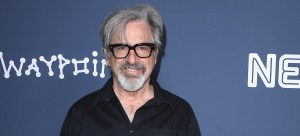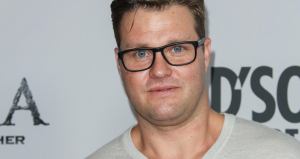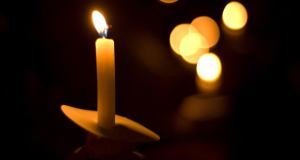Liberty University in Lynchburg, Virginia, is under fire for re-opening amid the coronavirus pandemic. The school’s president, Jerry Falwell Jr., opted to open its doors after spring break was over in spite of the worldwide push for self-isolation to mitigate the spread of COVID-19. Now, many outspoken critics are holding Falwell responsible for his 11 sick students.
Liberty University is a private evangelical Christian university — one of the largest of its kind in the world. It enrolls about 15,000 students in person on its campus, and it did not send them home when the coronavirus pandemic hit the U.S. According to a report by The New York Times, Falwell decided not to close down.
Videos by PopCulture.com
The result was 11 Liberty students falling ill by Friday — days after returning to campus. Three of the students were reportedly sent to nearby hospitals, while eight others were told to self-isolate. Falwell spoke in an interview on Sunday, saying: “Liberty will be notifying the community as deemed appropriate and required by law.”
State and local officials scratched their heads over Falwell’s decisions, but did not openly condemn him. People living in the nearby city of Lynchburg are reportedly furious, and their anger is spreading through social media.
The physician who runs Liberty’s student health service, Dr. Thomas Eppes Jr., suggested that the problem on campus was not epidemiological, but a sign of “the political divide.” This drew even more criticism down on the school, as people on both sides of the political aisle call for steps to be taken to slow the spread of the coronavirus.
“If Liberty sneezes, there are people who don’t like the fact that Liberty sneezed,” Eppes said. “Mr. Falwell called me to listen to a view that wasn’t exactly his. Great leaders do that type of thing.”
Here is what social media has to say about Liberty University’s surprise re-opening and the resultant health crisis on campus.
Predictable
Raise your hand if you saw this coming ……. https://t.co/UC4qJY6wyh
— Molly Jong-Fast🏡 (@MollyJongFast) March 29, 2020
Many people hearing about conditions at Liberty University this weekend called the results predictable. From the time news first broke that the campus would be re-opening, many were anticipating a catastrophic outbreak among the students there.
‘Lock Him Up’
Needs to get attention:
— Ricky Davila (@TheRickyDavila) March 30, 2020
Fake Religious Lunatic Jerry Falwell Jr invited almost 2,000 students back to Liberty University even though the pandemic was accelerating.
1 week later, 12 students display COVID-19 symptoms, then 800 students leave campus again in panic.
Lock him up.
Lots of people on Twitter called for Falwell to be charged with a crime for re-opening Liberty University. Many wanted to see him serve time in prison over it as well, feeling that the danger he caused to society was incalculable.
Politicized
The Gov. of Va. has closed schools for the year. Jerry Falwell Jr. has reopened Liberty Univ. endangering students & the community. He says “We’re conservative, we’re Christian, and therefore we’re being attacked.”No, you’re just being selfish & stupid.https://t.co/Yh8xw4SBQW
— Michael Steele (@MichaelSteele) March 30, 2020
Falwell was not only condemned for re-opening his school, but for making it a political action rather than a public health crisis. Some of his quotes were shared outside of interviews and articles, showing how he argued that Liberty was being “attacked” for partisan reasons, not coronavirus.
Legal Considerations
Lawyer up. Cuz lawyers will be coming. Wonder if insurance will cover it. It’s arguably an intentional act by university for which the injuries could’ve been reasonably anticipated. Mr. Falwell could be personally liable. If it’s deemed intentional, bankruptcy may not help. Hmm. https://t.co/0oY0LY1ogV
— Daniel Mark Extrom (@DanMarkEx) March 29, 2020
Some lawyers on Twitter shared their predictions about where a case like this could go from different angles. Many suggested that Liberty students or even Lynchburg residents get lawyers and prepare to sue Falwell.
Refunds
They couldn’t pray away COVID19? Falwell jr. just didn’t want to return student’s money a paid for room and board. https://t.co/36Mrnj5FyR
— Tombug64 (@Tombug641) March 30, 2020
Some guessed that Falwell did not close the school because he did not want students to ask for refunds on the services they received on campus. However, with most other schools closing as well, this has not been a concern for other colleges, so it is not clear why Falwell would have thought differently. There is no evidence to suggest that this was a real consideration for him.
People of Lynchburg
This on the same day Falwell unleashes his Liberty University CO-19 outbreak on the people of Lynchburg, VA.
— Bill Weinstein (@BillWeinsteinOH) March 30, 2020
Sympathy was in short supply in this story, even for the students in many cases, as people said that they should have known better than to go back to campus. However, the group people were really sad for was the residents of Lynchburg, Virginia, who now face an influx of new cases in their community that should have been prevented by Falwell.
‘Believe Scientists’
Must be a @JerryFalwellJr @LibertyU follower. Or a horrible outcome of Falwell’s negligent homicidal behavior. People need to believe scientists and medical professionals instead of the idiots who don’t know what they’re talking about! His poor family. #StayAtHomeAndStaySafe https://t.co/ha6I5dfkc4
— 🆃🆁🆄🅳🆈 ⁷ (@AgingARMY63) March 30, 2020
Finally, many people used this as yet another indication of why the general public needs to take more of its cues from scientists and medical professionals. They asked everyone from college presidents to world leaders to listen closely to what doctors are saying right now and go by the data.








